代词基础 pronoun
英语基础词性
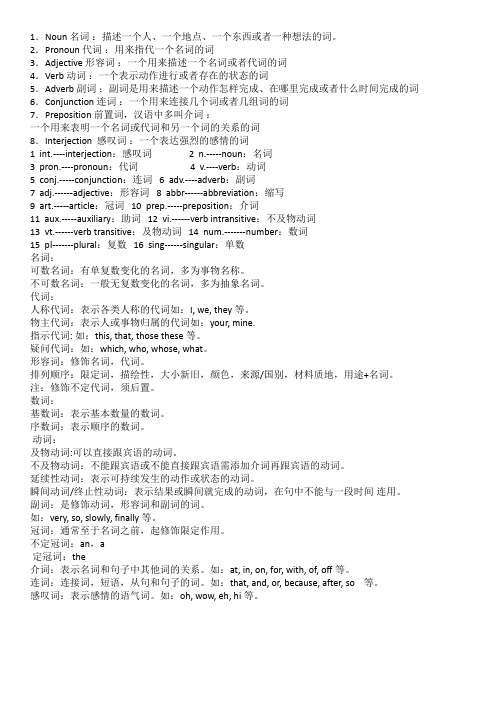
1.Noun 名词:描述一个人、一个地点、一个东西或者一种想法的词。
2.Pronoun 代词:用来指代一个名词的词3.Adjective 形容词:一个用来描述一个名词或者代词的词4.Verb 动词:一个表示动作进行或者存在的状态的词5.Adverb 副词:副词是用来描述一个动作怎样完成、在哪里完成或者什么时间完成的词6.Conjunction 连词:一个用来连接几个词或者几组词的词7.Preposition 前置词,汉语中多叫介词:一个用来表明一个名词或代词和另一个词的关系的词8.Interjection 感叹词:一个表达强烈的感情的词1 int.----interjection:感叹词2 n.-----noun:名词3 pron.----pronoun:代词4 v.----verb:动词5 conj.-----conjunction:连词6 adv.----adverb:副词7 adj.------adjective:形容词 8 abbr------abbreviation:缩写9 art.-----article:冠词 10 prep.-----preposition:介词11 aux.-----auxiliary:助词 12 vi.------verb intransitive:不及物动词13 vt.------verb transitive:及物动词 14 num.-------number:数词15 pl-------plural:复数 16 sing------singular:单数名词:可数名词:有单复数变化的名词,多为事物名称。
不可数名词:一般无复数变化的名词,多为抽象名词。
代词:人称代词:表示各类人称的代词如:I, we, they等。
物主代词:表示人或事物归属的代词如:your, mine.指示代词: 如:this, that, those these等。
疑问代词:如:which, who, whose, what。
各类pronouns解读
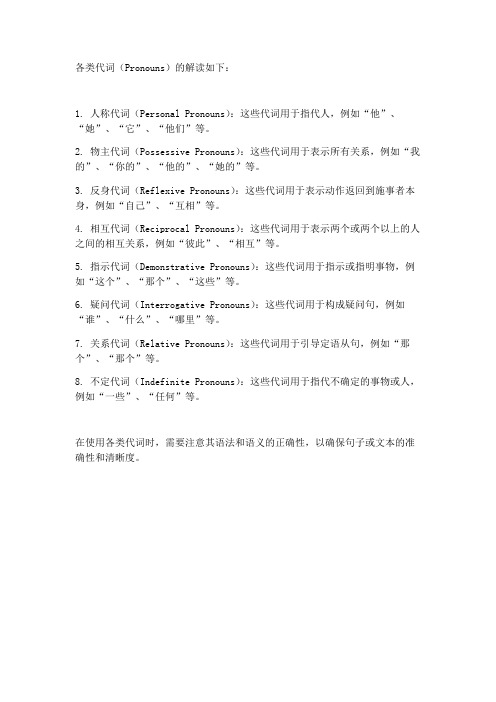
各类代词(Pronouns)的解读如下:
1. 人称代词(Personal Pronouns):这些代词用于指代人,例如“他”、“她”、“它”、“他们”等。
2. 物主代词(Possessive Pronouns):这些代词用于表示所有关系,例如“我的”、“你的”、“他的”、“她的”等。
3. 反身代词(Reflexive Pronouns):这些代词用于表示动作返回到施事者本身,例如“自己”、“互相”等。
4. 相互代词(Reciprocal Pronouns):这些代词用于表示两个或两个以上的人之间的相互关系,例如“彼此”、“相互”等。
5. 指示代词(Demonstrative Pronouns):这些代词用于指示或指明事物,例如“这个”、“那个”、“这些”等。
6. 疑问代词(Interrogative Pronouns):这些代词用于构成疑问句,例如“谁”、“什么”、“哪里”等。
7. 关系代词(Relative Pronouns):这些代词用于引导定语从句,例如“那个”、“那个”等。
8. 不定代词(Indefinite Pronouns):这些代词用于指代不确定的事物或人,例如“一些”、“任何”等。
在使用各类代词时,需要注意其语法和语义的正确性,以确保句子或文本的准确性和清晰度。
代词pronouns
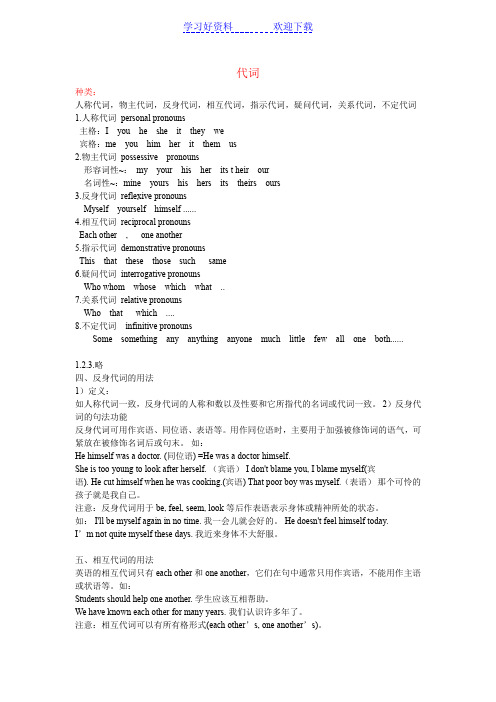
代词种类:人称代词,物主代词,反身代词,相互代词,指示代词,疑问代词,关系代词,不定代词1.人称代词personal pronouns主格:I you he she it they we宾格:me you him her it them us2.物主代词possessive pronouns形容词性~:my your his her its t heir our名词性~:mine yours his hers its theirs ours3.反身代词reflexive pronounsMyself yourself himself ......4.相互代词reciprocal pronounsEach other , one another5.指示代词demonstrative pronounsThis that these those such same6.疑问代词interrogative pronounsWho whom whose which what ..7.关系代词relative pronounsWho that which ....8.不定代词infinitive pronounsSome something any anything anyone much little few all one both......1.2.3.略四、反身代词的用法1)定义:如人称代词一致,反身代词的人称和数以及性要和它所指代的名词或代词一致。
2)反身代词的句法功能反身代词可用作宾语、同位语、表语等。
用作同位语时,主要用于加强被修饰词的语气,可紧放在被修饰名词后或句末。
如:He himself was a doctor. (同位语) =He was a doctor himself.She is too young to look after herself. (宾语) I don't blame you, I blame myself(宾语). He cut himself when he was cooking.(宾语) That poor boy was myself.(表语)那个可怜的孩子就是我自己。
pronouns(代词的用法)

宾语
which / that my best friend gave I like reading the books __________ me as gifts.
定语从句 The girl ____ won the gold medal comes from Beijing Sunshine Secondary School. A. who B. which C. what D. whom
me
you him her it
we
you they
us
you them
Mary, please show______ your picture. A. my B. mine C. I D. me
解析:show sb. sth. 空白处需要间接宾语,所以选人称代 词的宾格形式。
Possessive pronouns(物主代词)
(物主代词)
self pronouns (反身代词)
Pronouns
(代词)
demonstrative pronouns
interrogative pronouns (疑问代词)
(指示代词) relative pronouns
(关系代词)
Round 1!
Exercises for each group!You can choose a letter and do the exercises behind it.
类别 人称
数
第一人称
形容词性 物主代词
名词性 物主代复 数
第一人称 第二人称 第三人称
my your his her its our your their
mine yours his hers
代词 (Pronouns) 知识点.
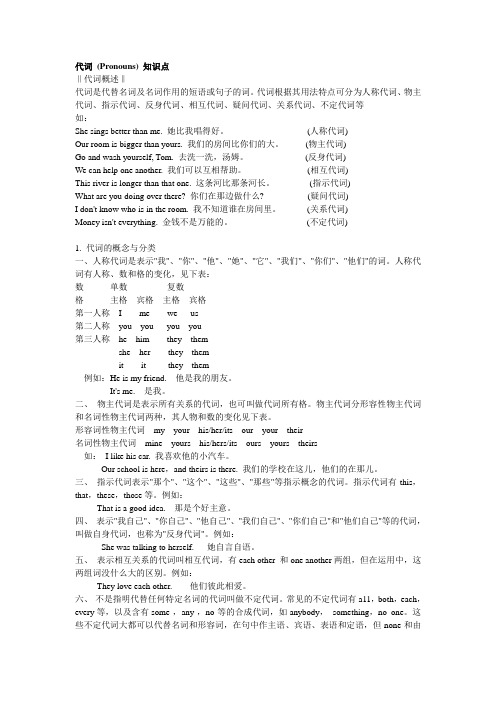
代词(Pronouns) 知识点‖代词概述‖代词是代替名词及名词作用的短语或句子的词。
代词根据其用法特点可分为人称代词、物主代词、指示代词、反身代词、相互代词、疑问代词、关系代词、不定代词等如:She sings better than me. 她比我唱得好。
(人称代词)Our room is bigger than yours. 我们的房间比你们的大。
(物主代词)Go and wash yourself, Tom. 去洗一洗,汤姆。
(反身代词)We can help one another. 我们可以互相帮助。
(相互代词)This river is longer than that one. 这条河比那条河长。
(指示代词)What are you doing over there? 你们在那边做什么? (疑问代词)I don't know who is in the room. 我不知道谁在房间里。
(关系代词)Money isn't everything. 金钱不是万能的。
(不定代词)1. 代词的概念与分类一、人称代词是表示"我"、"你"、"他"、"她"、"它"、"我们"、"你们"、"他们"的词。
人称代词有人称、数和格的变化,见下表:数单数复数格主格宾格主格宾格第一人称I me we us第二人称you you you you第三人称he him they themshe her they themit it they them例如:He is my friend.他是我的朋友。
It's me.是我。
二、物主代词是表示所有关系的代词,也可叫做代词所有格。
物主代词分形容性物主代词和名词性物主代词两种,其人物和数的变化见下表。
初中代词知识点pronoun
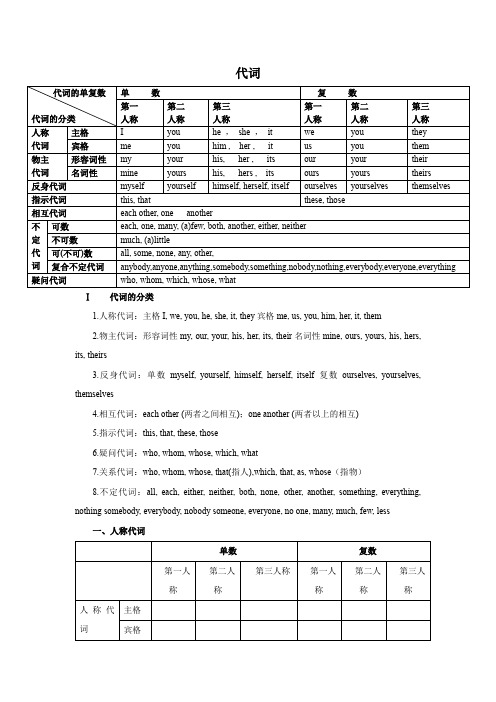
代词Ⅰ代词的分类1.人称代词:主格I,we,you,he,she,it,they宾格me,us,you,him,her,it,them2.物主代词:形容词性my,our,your,his,her,its,their名词性mine,ours,yours,his,hers,its,theirs3.反身代词:单数myself,yourself,himself,herself,itself复数ourselves,yourselves,themselves4.相互代词:each other (两者之间相互);one another (两者以上的相互)5.指示代词:this,that,these,those6.疑问代词:who,whom,whose,which,what7.关系代词:who,whom,whose,that(指人),which,that,as,whose(指物)8.不定代词:all,each,either,neither,both,none,other,another,something,everything,nothing somebody,everybody,nobody someone,everyone,no one,many,much,few,less一、人称代词1.作主语I meant to come on time, bit I was being in a traffic jam.2.作宾语Tell him to call back a little later.3.代词的指代问题1)不定代词anybody,everybody,nobody,anyone,someone,everyone,no one,及whoever和person在正式场合使用时,可用he,his,him代替。
如:Nobody came,did he? 2)动物名词的指代一般用it或they代替,有时也用he,she,带有亲切的感情色彩。
代词(Pronouns)
人称代词:1)在简短的对话当中通用宾格:eg : I like English.---Me too.Have more wine? ---Not me! I don’t want any more.2)在表示比较的非正式文体中,常用宾格eg : He is taller than me.He is taller than I am3)在电话用语中常用主格eg : I wish to speak to Mary.----This is / It’s she.4)I thought it was she. 我以为是她I thought it to be her.I was taken to be she.我被当成了她。
They took me to be her.他们把我当成了她。
5)定代词:anybody / everybody / nobody / anymore / someone / everyone / no one在正式场合使用时可以用his / him来代替。
eg : Nobody came, did he?Everyone knows it, didn’t he?6)人称代词的顺序问题:A:You, he and I are of an age.We, you and they are good students.B:当承认错误或承担责任时:I, he and you / they, you and weC:在长辈对晚辈,或者长官对下属说话时,如果长官为第一人称:I and you try to finish it.D:No one believe it, but he and she.7)强调句式:It is he that did it.It is him that I met.名词性物主代词:1)做主语:Yours works better.你的更好使。
2)做宾语:I love motherland as much as you love yours.我爱我的祖国就像你爱你的祖国一样。
名词(nouns)与代词(pronoun)1
名词的用法
•
•
•
•
•
可数名词除非前面有冠词或表示 单数的限定词,否则要用其复数 形式,例如: If a person disobeys the order,he will be punished severely. The teacher firstly divided his students into four groups. The reference book can be used to answer questions,to solve problems or to obtain information on a particular topic. These courses are especially designed for senior students.
连接代词
• 8)连接代词有:what,who,whom,whose, which,用来连接主语从句、宾语从句和表浯 从句。Whoever,whomever,whichever, whatever为复合代词。例如: • I didn't know what to do at that very moment. • The government sell public houses to whoever provides enough amount Of money. • Whomever I worry about is none of your business. • Take whichever you like,please.
名词(noun) 代词(pronoun)
专有名词
•
• • • •
1、专有名词是个别的人、地、物、团体、机构等 的专用名称。 专有名词中实词的第一个字母要大写。 如:Beijing, Tom, the People’s Republic of China(中华人民共和国) 有些专有名词使用定冠词the。如:the Great Wall(长城) 姓氏名如果采用复数形式,则表示该姓氏一家人(复 数含义),如:the Greens( 格林一家人)。
02---Chapter Two 代词 Pronouns 语法讲解系列
Chapter Two 代词Pronouns一、基本概念代词是用来代替名词或名词性短语或句子的词类。
从本质上说,它属于名词性词类,即在不指出具体名词、名词短语或名词性句子的情况下,用以代替说明它的词类。
二、基本分类1、人称代词2、物主代词3、反身代词4.疑问代词1)分类2)A考点:疑问副词how (方式),when (时间),where (地点),why (原因);how组成的疑问副词短语:how often(提问频率“多久一次");how far (提问距离“多远”);how soon (“多快,多久以后”);how long (提问长度或时间段"多长,多久”);how much (提问价钱;提问不可数名词数量“多少”);how many (提问可数名词数量“多少”)5、不定代词1)分类:普通不定代词和复合不定代词注意:常用普通不定代词注意:常用复合不定代词2)用法:many和much:many与可数名词复数连用;与不可数名词连用。
如: I don't have many friends here. 在这里我没有很多的朋友.。
We can learn much with the help of him. 在他的帮助之下我们能学到很多。
some 和any:some, any既可以修饰可数名词,也可以修饰不可数名词;some常用在肯定句中;any多用于否定句、疑问句及条件句中。
some用于表示请求、邀请、建议的疑问句,或希望得到对方肯定回答的疑问句中如:Will you have another cup of tea? 再来杯茶好吗?Mum, could you give me some money? 妈妈,能给我些钱吗?当any表示“任何”或“无论哪一个”的含义时,可用于肯定句,You may come at any time that is convenient to you. 你可以在对你方便的任何时候来。
代词Pronoun解读
ship:The sailors saw a ship in the distance.She was sailing toward the rocky island.又如人们常称 呼自己喜爱的汽车为she或her: A:How's your new car?B:Terrific.She's going like a bomb.汽车的 女主人也可能称汽车为he或 him:The car needs some petrol.Let's fill him up at the next station. • 如果先行项为动物名称,通常用中性代词来指代,但是若说话人带有感情色彩,或者把动物拟人化 ,可用阳性或阴性代词。 • 当先行项为表示天体名称或某些抽象概念的名词时,代词或相应的限定词用中性,但是若说话人带 有感情色彩或把这些无生命物拟人化,也可以用he she,依习惯而定。 • 当先行项为国家名词时,如果仅视为地理名词,代词或相应的限定词用中性,但若视为政治实体或 者说话人带感情色彩,代词或相应的限定词用阴性。China is in East Asia.It is one of the largest countries in the world. In the last decade of the 20th century,China began to assume her role as a world power.
- 1、下载文档前请自行甄别文档内容的完整性,平台不提供额外的编辑、内容补充、找答案等附加服务。
- 2、"仅部分预览"的文档,不可在线预览部分如存在完整性等问题,可反馈申请退款(可完整预览的文档不适用该条件!)。
- 3、如文档侵犯您的权益,请联系客服反馈,我们会尽快为您处理(人工客服工作时间:9:00-18:30)。
Objective
Possessive
number Singular Plural Singular Plural S i n g u l a r P l u r a l
person
1st person I
we me
us my
our
mine
ours
2nd
you
person
you you
you your yours
• Replace the personal pronouns by possessive adjectives.
1. ______is dreaming. (George) 2. ______is green. (the blackboard) 3. ______ are on the wall. (the posters) 4. ______ is running. (the dog) 5. ______ are watching TV. (my mother and
2.My mum's name is Angie. (Angie) ___is from Germany.
3.Bob is my dad. (My dad) ___is a waiter.
4.On the left you can see Simon. (Simon) ___is my brother.
for(she)___. 2. My children like Disney films. The video is
for(they) ___. 3. My brother Matt collects picture postcards.
These postcards are for(he) ___. 4. My parents like Latin music. The CD is
your yours
3rd person he, she it
they him, her them his her its their
It
his hers its theirs
Antecedent John girls
Pronoun he
it
Person third
first
smoke we
second
5.(Sue and Simon) ___are twins.
6. Our dog is a girl, Judy. (Judy) ___is two years old.
7. (Sue, Simon, Angie and Bob) ___live in Canterbury.
8. (Canterbury) ___is not far from London.
I) 6. ______ are in the garden. (the flowers) 7. ______ is riding his bike. (Tom) 8. ______ is from Bristol. (Victoria) 9. ______ has got a brother. (Diana) 10.______ Have got a computer, Mandy?
Replace the words in brackets by the correct personal pronouns. Note that Sue is the person speaking. The (*) means that you are asked a question.
1.My name is Sue. (Sue)___am English. And this is my family.
9. My grandparents live in London. (My grandparents) ___often come and see us.
10. What can (*) ___tell me about your family?
Fill in the correct pronouns. 1. My sister Jane loves books. This novel is
for(they) ___.
5. I like watches. This nice watch is for(I) ___.
6. My wife and I love sweets. These sweets are for(we) ___.
7. My nephew likes cars. The toy truck is for(he) ___.
8. My neighbor wants to go to California next year. The guide book is for(she) ___.
9. Here is another souvenir. I don't know what to do with(it) ___.
10. You know what? - It's for (you) ___.
Pronouns
Definition
A pronoun is a word that takes the place of a noun.
The antecedent is the word the pronoun replaces.
John likes to play ball. He is a good ball player.
peo singular
singular
plural
Examples
• Craig likes to play basketball. He is a good player.
• Today the girls came to the classroom. It was locked.
“He” takes the place of John. John is the antecedent. Personal pronouns can also be divided into
three groups called persons.
Personal Pronouns
case
Subjective
